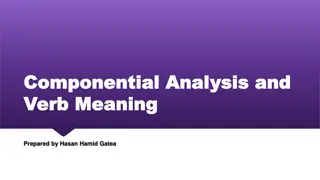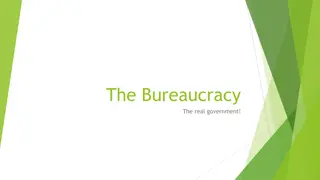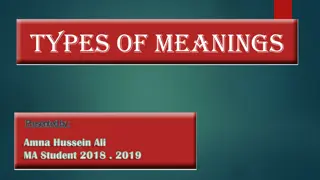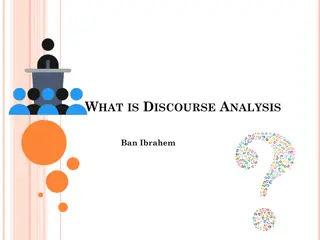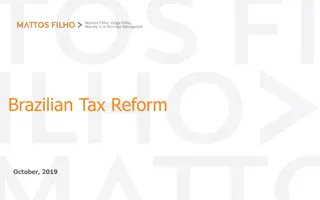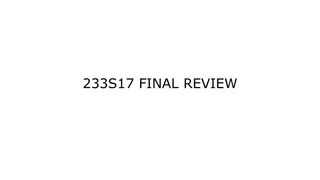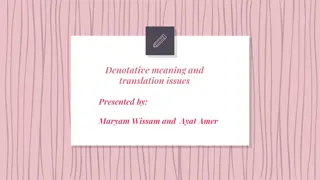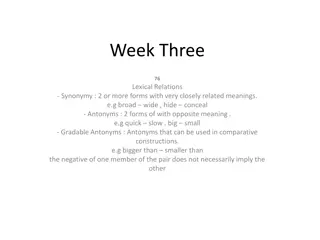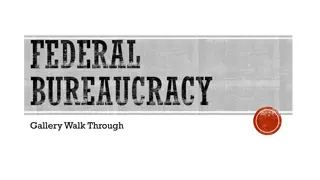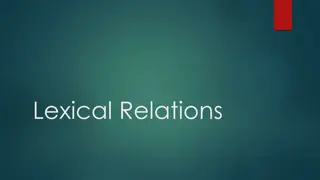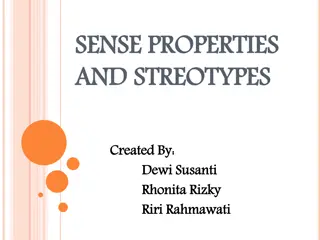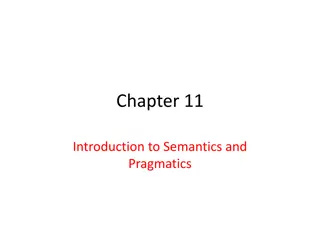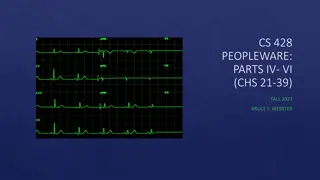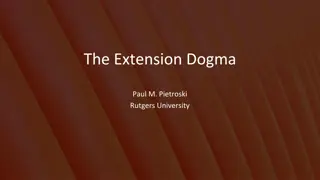Understanding Bureaucracy: Origins, Meanings, and Key Features
Bureaucracy, derived from the Latin term 'bureau', has evolved to represent a system of officials in power within public administration. This article explores the origins of the term, its various interpretations, and key features such as hierarchy, chain of command, and adherence to rules and regulations.
Download Presentation

Please find below an Image/Link to download the presentation.
The content on the website is provided AS IS for your information and personal use only. It may not be sold, licensed, or shared on other websites without obtaining consent from the author. Download presentation by click this link. If you encounter any issues during the download, it is possible that the publisher has removed the file from their server.
E N D
Presentation Transcript
ORIGIN OF THE TERM BUREAUCRACY Term bureaucracy is derived from the Latin term 'bureau Bureau means a writing table or desk. In French 'La Bure' or bureau means a cloth used on tables of public authorities. Later 'bureau' began to be ' used for the office room where table is kept. Thus by 18th century the term began to be used to refer to a place where officials work. During 18th and 19th centuries, the term was used consistently. It meant power of officials in Public Administration. It was also referred ' to the authority or power which the government departments claim to them. The term bureaucracy was first coined by a French economist, Vincent de Gournay in 1965.
MEANING OF BUREAUCRACY The term 'bureaucracy' is being used with different meanings to signify different things. After the term bureaucracy was coined by Vincent de Gournay, it has attracted attention from a number of scholars from different disciplines. It has its admirers as well as opponents. Max Weber, the Sociologist had almost "internalised" this concept;' whereas writers like Warren Bennis condemned the behavioural aspects of bureaucracy and even predicted 'its demise. It was Max Weber, a German sociologist, who gave it a respectable and positive implication.
Bureaucracy, in its simplest form, can be seen as "officials in power" or "a class of officials" or "bureaucrats exercising their power to carry on their constitutional duties and obligations ".The need, to use as an equivalent to the term "officials" or "administrators . Features of Bureaucracy 1. Hierarchy: , Bureaucracy is hierarchical. It is based on rank. Each rank or position is subordinate to some and superior to some other. The bottom to the top, generally, makes for a pyramidal structure with the lower ranks concentrated at the bottom and the higher ranks at the top.
Chain of Command: This feature is intimately linked with the one above. In any hierarchical body, there is a chain of command flowing from the top to the bottom. Normally, the command chain is not broken. example from the Indian context, in a Department of the Central Government in Delhi, the chain of command is as follows: Secretary Additional Secretary Joint Secretary Deputy Secretary Under Secretary Section Officer other lower ranks.
Adherence to Rules and Regulations: A classic feature of bureaucracies all along has been their rigid adherence to rules and regulations. This has, in fact, led to the adjective bureaucratic being coined for any person/organisation insisting too much on rules, regulations and procedures.
Impersonal/Faceless and Apolitical: A bureaucracy is supposed to be impersonal. Bureaucrat is expected to be guided by objective (as against subjective) considerations while following rules and regulations in the course of implementing various policy measures and directives. In other words, a bureaucrat or a civil servant or a government official whatever name we choose to call him by is not supposed to be guided by his personal whims and fancies, biases and prejudices in the discharge of his official duties.
faceless aspect, you perhaps are aware of the fact that any civilian bureaucracy is subordinate to the political executive. The political leadership is the face of the administration, while the bureaucracy works behind the scenes. It of course does not always happen but that is how it has been envisaged. Bureaucracy, strictly, is also supposed to be apolitical. This basically implies that a bureaucrat is not to have a political agenda of his own but rather, faithfully implement the policies of the government of the day. It also has another and possibly more important meaning and that is: a civil servant s loyalty and commitment should be to the constitution not to any political party, politician, etc.
TYPES OF BUREAUCRACY At different points of time in history the bureaucracy has taken different shapes and forms based upon the socio- political influences Bureaucracy is categorised into four types by Morstein Marx viz. 1. Guardian Bureaucracy, 2. Caste Bureaucracy, 3. Patronage Bureaucracy, and 4. Merit Bureaucracy.
1. Guardian Bureaucracy Plato's guardians have the capacity to personify in there, actions, the essence of public interest. They were considered the custodians of justice and welfare of the community. These guardians were selected on the basis of their education. Such' bureaucracy existed in China before 960 A.D. and in Russia between 640-1740 A.D. They were selected on the basis, of their scholastic achievements and trained in right conduct according to classics.
Caste Bureaucracy, This bureaucracy is the result of class connections of those-in power. In this, recruitment is made only from one class. This means persons belonging to higher classes or castes are only drawn to the civil services. For example, in ancient India, only Brahmins and Kshatriyas could become higher officials. In England, for example, aristocratic classes were preferred to the civil service positions.
Patronage Bureaucracy This type of bureaucracy is also called spoils system. Patronage in this is seen as a means of political control. Under this system, the patronages of the ministers or the elected functionaries are nominated to the civil service. The public jobs are distributed as personal or political favours to their supporters. In Britain, before 19th century, the system sewed the aristocracy to gain entirely into the civil services. But the system of patronage bureaucracy was condemned for its lack of competence, for its careless discipline, its concealed greediness, its irregular ways, and for its absence of spirit of service.
Merit Bureaucracy Merit bureaucracy is a response to the maladies of other types of bureaucracies which we have discussed earlier. In this bureaucracy recruitment is based on qualification and is governed by objective, standards. In modern times merit bureaucracy puts strong emphasis on political control over the administrative system which was not the case in, other forms of bureaucracy. This, bureaucracy has distinguished advantage over others due to its sense of rationality in administrative behaviour.
MAX WEBER THEORY OF BUREAUCRACY The invention of word bureaucracy belongs to Vincent de Gourney, a French economist It rapidly became a standard and accepted term in the conventions of political discourse. By the end of 19th century the term was widely held to have been of German origin. J.S. Mill, an eminent political scientist included bureaucracy in his series of analysis. Karl Marx also discussed about bureaucracy at certain places. According to Marx, bureaucracy like a state itself is an instrument by which the dominant class exercise its domination over the other social classes.
Hegel conceived the governing bureaucracy of public administration as a bridge between the state and the civil society. The above discussion shows that there existed a bureaucracy much earlier to Weberian writings and also there were attempts to understand the bureaucracy by different writings. But the Weber is considered to be the first person to attempt at the systematic understanding of the bureaucracy.
MAX WEBER ON AUTHORITY Max Weber s concept of bureaucracy is closely related to his ideas on legitimacy of authority. Weber differentiated authority, power and control Authority means the authoritarian power of command. exercise of power becomes acceptable if it is justified or legitimised Authority is state of reality where a person willingly complies with legitimate commands or orders because he considers that a person by virtue of his position could issue orders to him. The authority exists as long as it is accepted as legitimate by the ruled. Thus, an administrator or organisation can rule only when it has legitimacy.
TYPES OF AUTHORITY Weber believed that authority could be exercised as long as it is legitimate he divided the authority in to three types based on sources of legitimacy for each authority. Weber classified authority in to three types based on its claim to legitimacy. They are: (1) Traditional authority, (2) Charismatic authority and (3) legal-rational authority
(1) Traditional authority: In this kind of authority a command is obeyed because of the belief in age-old customs, traditions, conventions and beliefs. Traditional authority is based on the belief that what is customary is right. It is exemplified by the rule of kings in olden days Only persons of a ' certain high caste should be appointed to high positions, this principle was accepted as just. In other words, the merit of an individual was given less importance than the caste to which he belonged. In traditional authority new rules are not enacted, they are found . The only documents in the administration of law are the documents of tradition .
Under the traditional authority a person enjoy authority by virtue of their inherited status The system retains legitimacy as long as the customs and traditions are respected in the organisation. (2) Charismatic authority: The term charisma (gift of grace) is taken from the vocabulary of early Christianity. Here it is applied supernatural, super human or extraordinary qualities of a leader. Among the holders of charisma is the sorcerer, the prophet or the warrior of chieftain, mahatma, or gurus. In this type of authority obedience was justified because the person giving order had some sacred or outstanding character.
The leader exercises authority based on his personal qualities rather than formal stipulations or prescribed norms. The only basis of legitimacy is personal charisma. He can exercise his authority, so long as it is proved, that is so long as it receives recognition and is able to satisfy the followers. Under this authority the leader selects his disciples or followers as his officials based on their personal devotion to him rather than their special qualifications or status.
3.legal-rational authority Law is another name for a rational principle. Hence legal domination is based upon belief in the desirability of rational principles. The application of reason leads to efficiency. Obedience is owed to the legally established impersonal order Manifestations of legal authority are found in organisations where rules are applied judicially and in accordance with ascertainable principles valid for all members in the organisation. The members who exercise power under this authority are the superiors and are appointed or elected by legal procedures to maintain the legal orders.
Weber considers the legal authority as the most rational form of authority. Of all the three types of authority Weber considers the legal authority, not only the most rational authority, but also the most efficient form of authority. He considers bureaucracy as legal-rational type of authority.
MAX WEBER: THE CONCEPT OF BUREAUCRACY As in the case of authority, Weber categorised bureaucracy in to (1) patrimonial bureaucracy found in traditional and charismatic authorities and (2) legal-rational bureaucracy found only in the legal type of authority. FEATURES OF LEGAL-RATIONAL BUREAUCRACY (1) Official business is conducted on a continuous, regulated basis,
(2) An administrative agency functions in accordance with specified rules and is characterised by three interrelated aspects; (a) the powers and functions of each official is defined in termsof impersonal criteria, (b) the official is given matching authority to carry out his responsibility and (c) the means of compulsion at his disposal are strictly limited and the conditions under which their employment is legitimate are clearly defined, (3) Every official and every office is part of the hierarchy of authority. (4) Officials do not own the resources necessary for rendering the duties, but they are accountable for use of official resources. Official business and private affairs, official revenue and private income are strictly separated,
(5) Offices cannot be appropriated by the officers as private property and (6) Administration is conducted on the basis of written documents. FEATURES OF OFFICIALS model of bureaucracy, the features of officials. The staff members are personally free, observing only the impersonal duties of their offices, (2) They are appointed to an official position on the basis of the contract, (3) An official exercises authority delegated to him in accordance with impersonal rules, and his loyalty is expressed through faithful execution of his official duties,
(4) His appointment and job placements depend upon his professional qualifications, (5) His administrative work is full time occupation, (6) His work is rewarded by regular salary and by prospects of career advancement, (7) There is a clear cut hierarchy of officials, and (8) He is subjected to a unified control and disciplinary system.
Weberian model of bureaucracy 1. Impersonal Order 2. Rules 3. Sphere of Competence 4. Hierarchy 5. Separation of Personal and Public Ends 6. Written Documents 7. Monocratic Type: It means certain functions performed by bureaucracy cannot be performed by any other organisation. They monopolise certain functions and only the authorised official can perform that function, makes them monocratic in nature. Weber considered pure or monocratic bureaucracy is the most rational form of administrative staff.
MAX WEBER: LIMITS ON BUREAUCRACY Weber while emphasising on the necessity of bureaucracy was aware of the fact that, the bureaucracy has inherent tendency of accumulation of power. The sources of this power could be seen in the special knowledge, which the official poses. In order to prevent the bureaucracy from acquiring powers Weber suggested certain mechanism These mechanisms fall in to five major categories. The categories are: (1) collegiality, (2) separation of powers, (3) direct democracy, and (4) representation.
Collegiality In a monocratic bureaucracy, Weber meant that at each stage of the official hierarchy one person and one person only, had the responsibility for taking a decision. This makes the bureaucracy more powerful. To prevent this Weber suggested the principle of collegiality involving others in the decision making process. Weber considered that collegiality would always have an important role to play in limiting bureaucracy. But it has disadvantages in terms of speed of decision and attribution of responsibility.
Separation of powers Separation of powers meant dividing responsibility and functions between two or more bodies. For any decision to emerge a compromise between them had to be reached. This will avoid monopoly of decision by a single body or person. Weber regarded such a system as inherently unstable. Direct Democracy To limit the power of bureaucracy Weber suggested direct democracy, where the officials were guided by and answerable to an assembly. Short term of office, permanent possibility of recall was designed to serve the purpose of direct democracy. But this system is possible only in small organisations and in local governments.
Representation Another method of limiting bureaucracy is sharing of authority of bureaucracy with the elected representatives of the people. With this method it is possible to control the power of the bureaucracy. MAX WEBER S BUREAUCRACY: CRITICISM Robert Merton and other sociologist have questioned the rationality of Weber s model saying that it results in certain dysfunctional consequences because of its hierarchy and rules. Phillip Selznick, pointing to the division of functions in an organisation shows how sub-units setup goals of their own sometimes conflicting with the organisation as a whole.
Talcott Parsons questioned the internal consistency of Weber s bureaucracy. Parsons thinks that, this it is not always possible to ensure that the higher-level authority will be matched by equivalent professional skills. Weber s model is also not relevant in the context of development administration. Strict adherence to rules results in delay and inefficiency in the administration.
MAX WEBERS BUREAUCRACY: RELEVANCE In spite of criticism from the several scholars, the ideas of Weber on bureaucracy continue to be relevant to understand the present administrative system. So far we have not been able to evolve an alternative model to Weber s bureaucracy. Weber is right in saying that when we are accustomed to the bureaucracy we cannot think of any other alternative. It is highly useful for managing large-scale organisations. His ideas on selection of officials based on qualifications, utility of written documents in administration, hierarchy etc., can be seen in any administration of the present day. The bureaucracy proposed by Weber is superior to all other forms of organisations in achieving the prescribed The people who talk about the de-bureaucratisation of the society have not been able to find a viable alternative to the bureaucracy.



